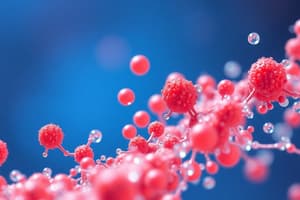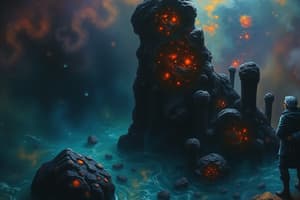Podcast
Questions and Answers
What is the primary element emitted by black smokers at higher temperatures?
What is the primary element emitted by black smokers at higher temperatures?
- Barium
- Calcium
- Iron (correct)
- Silicon
White smokers operate at higher temperatures than black smokers.
White smokers operate at higher temperatures than black smokers.
False (B)
What are extremophiles and where are they typically found?
What are extremophiles and where are they typically found?
Extremophiles are organisms that thrive in extreme environments, typically found around hydrothermal vents.
Cinnabar is scientifically known as ______.
Cinnabar is scientifically known as ______.
Match the following elements to their specific gravity rankings:
Match the following elements to their specific gravity rankings:
What conditions allow H2O and CO2 to be considered as 'fluids'?
What conditions allow H2O and CO2 to be considered as 'fluids'?
The primary composition of smoke emitted from white smokers is rich in iron and sulfur.
The primary composition of smoke emitted from white smokers is rich in iron and sulfur.
What happens to cinnabar in the process of gold extraction?
What happens to cinnabar in the process of gold extraction?
What is the primary mineral associated with the gossan zone?
What is the primary mineral associated with the gossan zone?
Realgar is a bright red mineral that contains arsenic sulfide.
Realgar is a bright red mineral that contains arsenic sulfide.
What economic and political challenges are often faced by countries with rich natural resources?
What economic and political challenges are often faced by countries with rich natural resources?
The process of mining can lead to _____, which acidifies waterways.
The process of mining can lead to _____, which acidifies waterways.
Match the mining zones with the minerals they contain:
Match the mining zones with the minerals they contain:
How deep is the deepest gold mine in the world going to be after new drilling?
How deep is the deepest gold mine in the world going to be after new drilling?
The temperature in the deepest gold mine can reach up to 80°C.
The temperature in the deepest gold mine can reach up to 80°C.
What type of rock typically holds ancient placer deposits of gold?
What type of rock typically holds ancient placer deposits of gold?
Flashcards
White Smokers
White Smokers
Hydrothermal vents that release fluids at lower temperatures (30-350°C), emitting lighter-colored minerals like calcium, barium, and silicon.
Black Smokers
Black Smokers
Hydrothermal vents that release fluids at higher temperatures (up to 400°C), emitting darker minerals like iron and sulfur.
"Smoke" in Hydrothermal Vents
"Smoke" in Hydrothermal Vents
The 'smoke' released from hydrothermal vents is actually mineral-laden water.
Volatiles in Hydrothermal Systems
Volatiles in Hydrothermal Systems
Signup and view all the flashcards
Critical Point
Critical Point
Signup and view all the flashcards
Solid Solution
Solid Solution
Signup and view all the flashcards
Cinnabar
Cinnabar
Signup and view all the flashcards
Cinnabar and Gold Extraction
Cinnabar and Gold Extraction
Signup and view all the flashcards
Why are quartz veins important for finding gold?
Why are quartz veins important for finding gold?
Signup and view all the flashcards
What is gossan, and why is it significant?
What is gossan, and why is it significant?
Signup and view all the flashcards
What is realgar, and why is it called 'powder of the mine'?
What is realgar, and why is it called 'powder of the mine'?
Signup and view all the flashcards
What is the 'resource curse'?
What is the 'resource curse'?
Signup and view all the flashcards
What is acid mine drainage, and how does it happen?
What is acid mine drainage, and how does it happen?
Signup and view all the flashcards
What are some environmental effects of mining?
What are some environmental effects of mining?
Signup and view all the flashcards
How deep is the deepest gold mine on Earth?
How deep is the deepest gold mine on Earth?
Signup and view all the flashcards
How old is the gold in the deepest gold mine on Earth, and what is its origin?
How old is the gold in the deepest gold mine on Earth, and what is its origin?
Signup and view all the flashcards
Study Notes
White and Black Smokers
- White smokers have lower temperatures (30–350°C) and emit lighter-colored minerals primarily calcium, barium, and silicon.
- Black smokers have higher temperatures (up to 400°C) and emit darker mineral particles, mainly iron and sulfur.
- Both are mineral-laden water plumes emitted from hydrothermal vents.
- Location: Oceanic ridges and volcanic areas (e.g., hotspots). Average depth ~2,000m.
- Extremophiles (bacteria, tube worms, clams) inhabit these environments.
Hydrothermal Fluids
- Water (H₂O) and carbon dioxide (CO₂) are common volatiles.
- Considered fluids at modest temperatures and pressures due to their ability to dissolve and transport materials. The critical point occurs when the volume change from gas to liquid becomes zero, and they're no longer different phases.
- Other volatiles: Hydrogen sulfide, methane, nitrogen.
Gold, Silver, and Copper Alloys
- This ternary system forms a continuous solid solution (gold readily mixes with silver and copper indefinitely).
- Atomic structure: Face-centered cubic (FCC) lattice.
- Bonding: Metallic bonding.
- Properties: High conductivity, malleability.
- Specific gravity: Gold > Silver > Copper.
- Color change with composition: Gold (yellow) > Silver (white) > Copper (red). Greater ratios of gold give yellow, greater ratios of copper give red, greater ratios of silver give whitish colors.
Cinnabar and Gold Extraction
- Cinnabar (HgS): Mercury sulfide used in gold extraction by amalgamation.
- Process: Heating cinnabar to release mercury, which then combines with gold (amalgamation).
- Environmental Concerns: Mercury pollution and toxicity.
Quartz Veins and Ore Deposits
- Quartz veins often host gold and other ore minerals.
- Formation occurs through hydrothermal processes associated with large igneous systems.
Gossan and Ore Bodies
- Gossan: Oxidized weathered zone of ore bodies, indicates sulfide ores beneath.
- Minerals by Zone:
- Gossan: Iron oxides
- Leached zone: Clays, oxides, carbonates
- Enriched zone: Copper, silver, gold
- Primary ore: Sulfide minerals
Realgar
- Realgar (As₂S₂): Bright red arsenic sulfide mineral.
- Nickname "Powder of the Mine" for its powdery form and use in early mining.
Resource Curse
- Countries with abundant resources often face economic and political challenges due to dependence.
Acid Mine Drainage
- Acid mine drainage forms when exposed sulfide minerals react with water to form sulfuric acid, contaminating waterways and harming ecosystems.
Environmental Effects of Mining
- Environmental effects include deforestation, habitat loss, water contamination, air pollution, and soil erosion.
Deepest Gold Mine
- Located in South Africa, approximately 4 km deep.
- New drilling target: 4.5 km.
- Discovery: Early 20th century
- Temperature: Up to 60°C (from Earth's core heat)
- Main danger aside from blasting: Rock bursts due to pressure.
- Gold origin: Ancient placer deposits (conglomerate rocks).
- Age of gold: Very old.
- Extraction: Crushing, grinding, cyanidation.
- Blasting safety: Keep mouths open during blasts to prevent eardrum damage from pressure changes.
Studying That Suits You
Use AI to generate personalized quizzes and flashcards to suit your learning preferences.
Description
Explore the fascinating world of hydrothermal vents with this quiz. Learn about the differences between white and black smokers, the unique extremophiles they host, and the role of hydrothermal fluids. Test your knowledge on the mineral-laden plumes found in these extreme environments.




